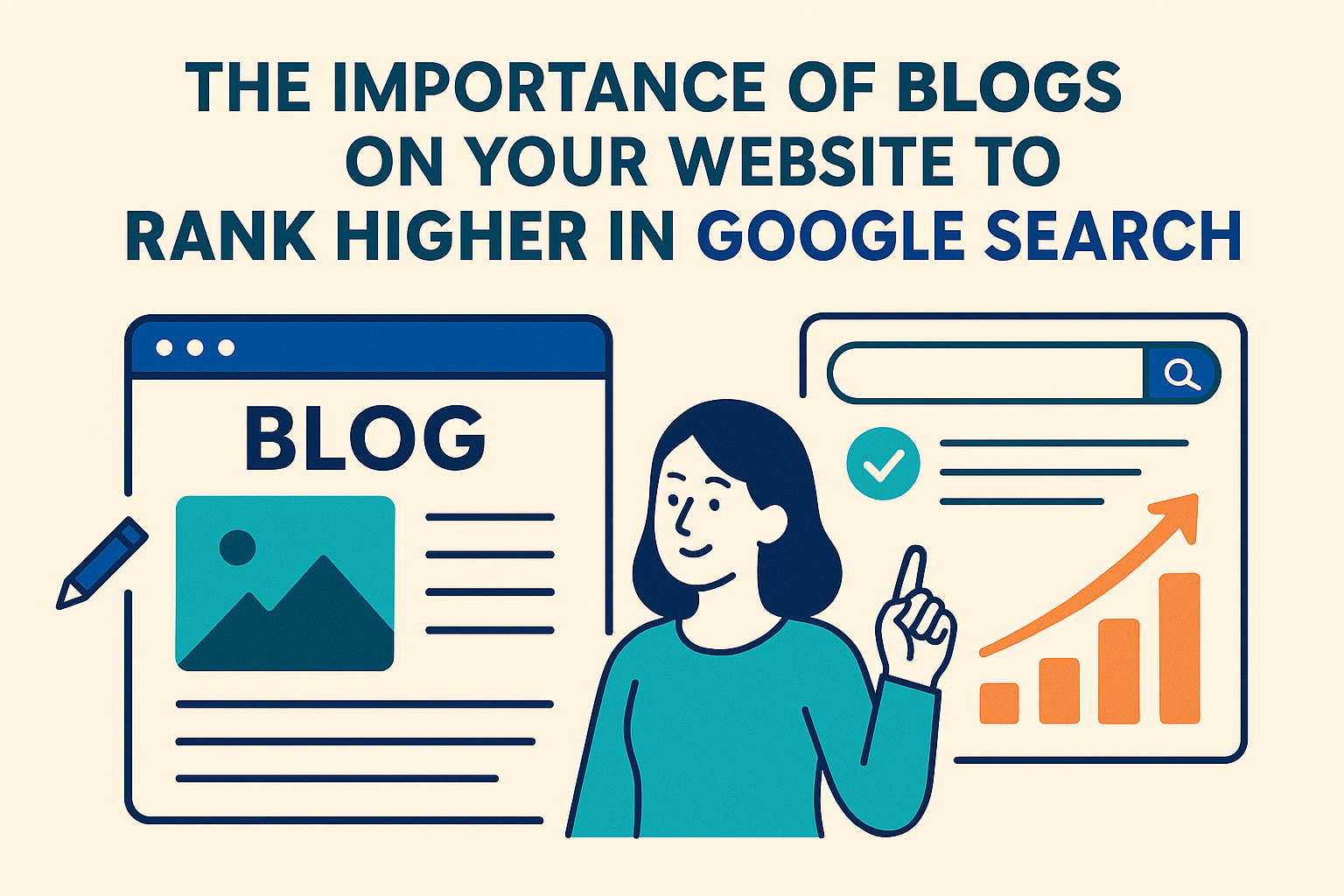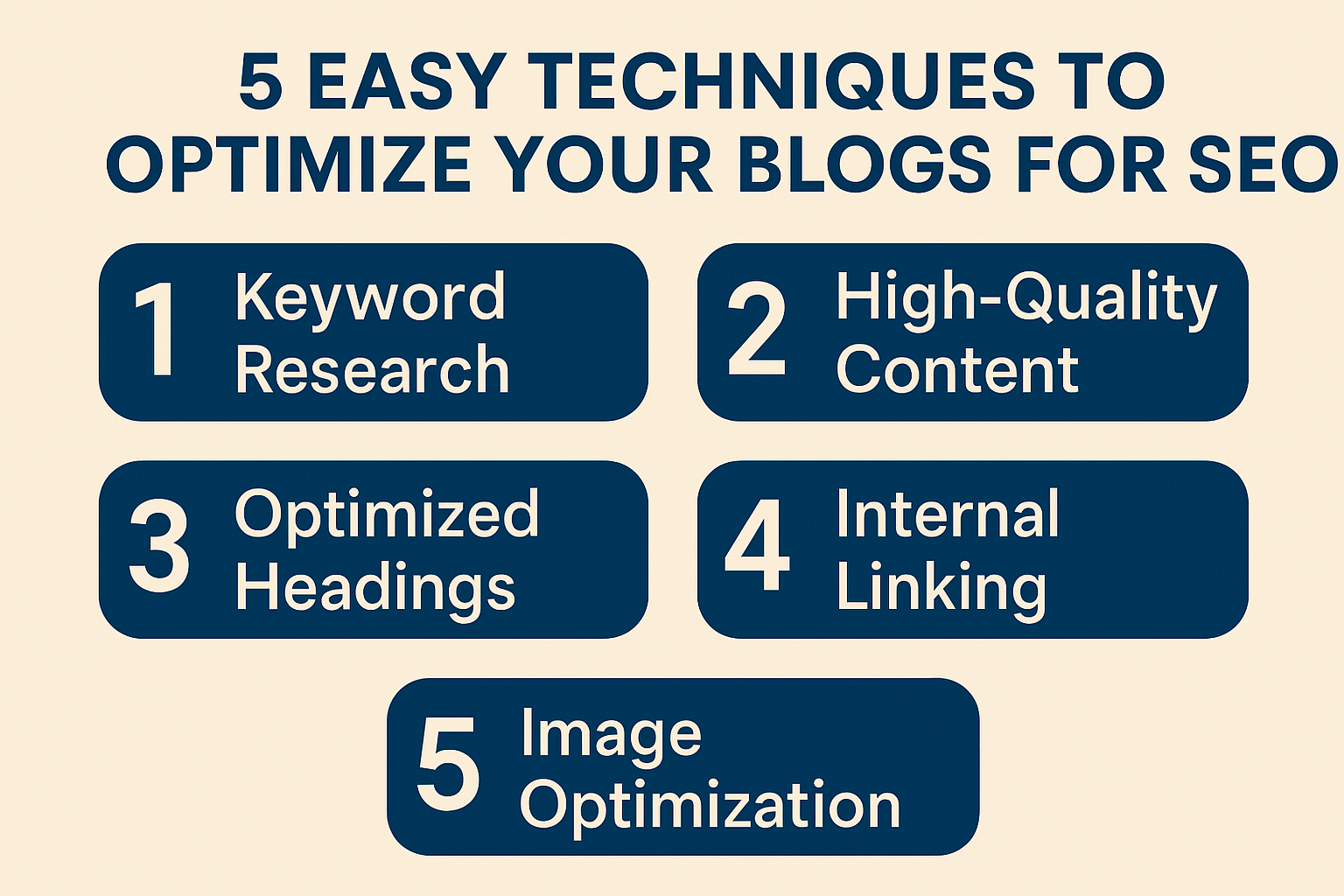The Importance of Blogs on Your Website to Rank Higher in Google Search
The Importance of Blogs on Your Website to Rank Higher in Google Search
In today’s digital age, a website is a critical tool for businesses to showcase their products or services to the world. However, having a website alone is not enough to attract visitors and improve your online visibility. To stand out from the competition and rank higher on Google search, businesses must ensure they have high-quality content that is informative, engaging, and optimized for search engines. This is where blogs come in, and in this post, we will discuss the importance of integrating blogs into your website for higher search engine rankings.
1) Improves Search Engine Rankings: Blogging is crucial to search engine optimization (SEO) because it provides fresh and relevant content that search engine algorithms love. Regularly publishing blogs on your website can help improve your ranking on search engine pages, leading to more traffic and higher conversions.
2) Enhances Engagement with Your Audience: Business blogs are an excellent way to create a conversation with your audience and engage with them directly. You can share your company’s news, industry insights, best practices, trends, and more. This provides valuable information to your readers and builds long-term relationships with your target audience, leading to higher brand loyalty and increased sales.
3) Establishes Your Business as an Authority: By sharing your expertise and insights in your industry via blogs, you can establish your business as an authority in your field. This helps build trust and credibility with your target audience, leading to more website visits, social media shares, and backlinks – all crucial for higher search engine rankings.
4) Drives Traffic and Conversions: Including a blog on your website can help drive more qualified traffic to your site because users are looking for information, and blogs are a great way to answer their questions. Additionally, well-optimized blogs can help drive more conversions by showcasing your products or services, providing compelling calls-to-action, and establishing your business as the expert they should trust.
5) Provides Opportunities for Link Building: Link building is another critical aspect of SEO, and having a blog on your website can provide opportunities to acquire quality backlinks. Businesses and other bloggers are likelier to link to high-quality content that provides value to their readers. By creating informative, relevant, and useful blog posts, you can attract these links and improve your website’s authority in Google’s eyes.
In conclusion, implementing a blog on your website is crucial for improving your search engine ranking and establishing your business as an authority in your industry. By regularly publishing well-optimized and informative blogs, you can engage with your audience, establish credibility, and drive more traffic and conversions. At the end of the day, providing high-quality content that resonates with your target audience is the key to success in today’s digital age, and integrating a blog into your website is a crucial step toward achieving those goals.
The Importance of Capturing Interest in the First Seconds of Your Website
 When it comes to your website, the first impression is everything. You want your visitors to stay, read and eventually convert into leads or customers. But with so much online competition, capturing their interest in the first few seconds they land on your website is essential. In this blog post, we’ll discuss the importance of a captivating introduction and how to achieve it.
When it comes to your website, the first impression is everything. You want your visitors to stay, read and eventually convert into leads or customers. But with so much online competition, capturing their interest in the first few seconds they land on your website is essential. In this blog post, we’ll discuss the importance of a captivating introduction and how to achieve it.
1. Know your audience
The first step in creating a captivating introduction is knowing your target audience. Who are they, what do they want, and what problems do they need solving? Once you have a clear picture of your ideal customers, you can craft an introduction that resonates with them. Use language that speaks directly to their needs and interests, and show them that your website has what they’re looking for.
2. Use strong visuals
Humans are visual creatures, and first impressions are heavily influenced by what we see. Use high-quality images, videos, or animations to convey your message and grab your audience’s attention. Ensure those visual elements are relevant to your message, and avoid generic stock photos that look like they belong on thousands of other websites.
3. Keep it clear and concise
In today’s fast-paced world, people don’t have the time or patience for lengthy, complicated introductions. Keep your message clear and concise, and make sure your visitors understand what your website is about within the first few seconds. Avoid jargon and buzzwords your audience might not understand, and try to get straight to the point.
4. Highlight your unique selling proposition (USP)
What sets your website apart from the competition? In your introduction, highlight your unique selling proposition to show your visitors why they should choose your website over others. It could be a particular product or service only you offer, excellent customer service, or unbeatable pricing. Whatever it is, make sure it’s easy to see in your introduction.
5. Test, measure, and refine
Creating a captivating introduction is not a one-time task. You need to test different versions, measure their effectiveness, and refine your approach based on the results. Use website analytics tools to see how visitors behave on your website and whether they stay or bounce off quickly. If you notice a high bounce rate, it’s time to revisit your introduction and make some changes.
You only have a few seconds to capture your audience’s interest, so make them count. Know your audience, use strong visuals, keep your message clear and concise, highlight your unique selling proposition, and test, measure, and refine. With these tips, you can create an introduction that hooks your visitors and keeps them reading, helping to boost your conversions and grow your business.
Why Hiring a Website Content Writer is the Right Decision
In today’s digital age, having a website for your business is essential. It is your online presence where customers can find your products and services. However, creating and maintaining a website is not an easy task. One of the critical aspects of your website is the content. Your content should be engaging and informative, which can be time-consuming and arduous. You might think of doing it yourself as a business owner, but it could be a mistake. This blog post will discuss why hiring a website content writer is the right decision.
1. Saves Time
Time is a valuable commodity for a business owner. You must focus on essential business functions such as product development, sales, and customer interaction. Writing content for your website can eat up your time that is better spent on these critical tasks. Hiring a website content writer is the right choice because they can create high-quality content with little to no involvement from you. It frees up your time, allowing you to focus on business growth.
2. Professional Writing Skills
Not everyone is an expert in writing articles or website content. Writing for your website requires knowledge of SEO, marketing tactics, and grammar rules. A content writer possesses the necessary skills and experience to create compelling content for your website that will attract and engage your audience. They better understand keyword placement, call-to-action phrases, and audience targeting. Hiring a website content writer ensures your content is professional and relevant to your audience.
3. Fresh Perspectives
You are limited to your perspective when you write content for your website. Hiring a website content writer opens up new perspectives and ideas that can take your website to new heights. A content writer has experience writing for different businesses and industries. They can bring fresh ideas, highlight your unique selling points, and tailor your content to your target audience. This could lead to an increase in website traffic and customer engagement.
4. Consistency
Consistency is vital in the website content. Content should be updated regularly to keep your website relevant, SEO optimized, and engaging. Hiring a content writer ensures that your website is regularly updated with fresh new content consistent with your brand’s voice, values, and objectives. A content writer can create an editorial calendar to organize your content schedule.
SEO is critical for having an online presence. A website content writer has experience with SEO and can optimize your content for search engines. This means your website will rank higher on search engines, leading to more website traffic and leads. They know how to research keywords, write metadata, and create SEO-friendly content.
 In conclusion, creating website content that is engaging, informative, and SEO optimized is not an easy task. Hiring a website content writer frees you up to focus on essential business tasks, provides professional writing skills, offers fresh new perspectives, ensures consistency, and optimizes your website for SEO. Hiring a website content writer is an investment in your business that can help your website grow and attract new customers. So, it’s the right decision for your business.
In conclusion, creating website content that is engaging, informative, and SEO optimized is not an easy task. Hiring a website content writer frees you up to focus on essential business tasks, provides professional writing skills, offers fresh new perspectives, ensures consistency, and optimizes your website for SEO. Hiring a website content writer is an investment in your business that can help your website grow and attract new customers. So, it’s the right decision for your business.
How Writing Blogs Can Help Build Your Brand Reputation
Writing blog posts for your website can be one of the most effective methods when building a solid online presence. In today’s digital era, businesses wishing to connect with their target audience must develop a brand reputation that resonates with their users. Writing blogs tailored to your audience’s interests and preferences can make your brand stand out and provide valuable information to keep your customers informed and engaged. In this blog post, we will discuss how writing blogs can help build your brand reputation and get informative information to your users.
1. Increases Website Traffic:
Writing blog posts can help improve your website’s search engine visibility, increasing traffic and potential customers. Every informative and well-structured blog posts contain relevant keywords, making it easier for search engines like Google to index your website. If your website appears frequently in search engines, it will result in increased organic traffic, which will help you reach your target audience more effectively.
2. Establishes Authority:
Creating blog posts that discuss industry-related topics or provide expert advice can help establish your brand’s authority. Offering specialized advice concerning your company’s products or services can help your brand reach a wider audience, especially those looking for niche solutions. Eventually, your brand will be regarded as an authority in your industry, which could increase user trust, engagement, and, ultimately, sales.
3. Provides Valuable Information:
Content marketing, mainly through website blogs, is essential in informing your target audience about your company and its products or services. Blog posts provide valuable information to your customers, guiding them in making informed decisions. For instance, answering FAQs on your blog can help your customers make informed purchase decisions, demonstrate expertise, and provide social proof.
4. Humanizes Your Brand:
People do business with people, not companies. By writing blog posts in a conversational and approachable tone, your brand can create an authentic connection with your users, making you more relatable and down-to-earth. This could increase user engagement on your blog and enhance customer confidence in your brand.
5. Encourages Customer Feedback and Engagement:
Blog posts allow for feedback and engagement, promoting dialogue between your brand and target audience. People enjoy giving their opinions, and by creating a space for users to share their thoughts about your blog posts, you’re allowing them to connect with your brand more naturally. Treated carefully and respectfully, feedback will provide valuable insight into what your users want, allowing you to adjust your content accordingly.
In conclusion, writing blogs for your business website greatly benefits your company’s growth. It elevates your brand’s online presence, establishes your expertise, provides valuable information to your users, humanizes your brand, and promotes customer engagement. Providing thoughtful, well-written blog posts will increase user engagement and establish a loyal following within your industry—the key to a successful business.












